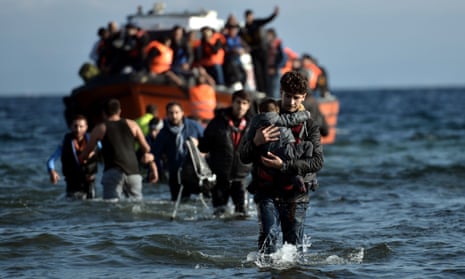Britain will be adopting a morally unacceptable position if it turns its back on the refugee crisis in Europe, according to the United Nations special representative for international migration.
As winter weather sets in across Europe, Peter Sutherland, a former attorney general of Ireland, and chairman of the London School of Economics, said: “This is not a transient issue. It challenges the moral fabric of the societies we live in. To think, to be told, that your country can in some way isolate itself from the crisis is insane. It’s completely wrong.” Sutherland added: “Are we going to allow refugees to stand in freezing rivers at our borders this winter, to live in freezing tents with their children?”
Speaking after the European Commission estimated that more than three million more people are expected to arrive in the EU by the end of next year and that those numbers are not expected to diminish until 2017, Sutherland said the EC had mechanisms to deal with the crisis, but that the humanitarian response had been woefully inadequate. “If the national debate is all around the negatives, keeping people out, then of course it’s going to be polarised and xenophobic,” he said. “This is not me having an Anglophobic rant. Right across Europe the evidence is that migration makes a positive contribution, not a negative one. Migrants contribute far more than they take out and they are necessary to keep a balance between retirees and workers.”
Sutherland has been scathing of the language of “racism and xenophobia” used by David Cameron and other heads of state, criticising them for dismissing the plight of those they called “economic migrants”. But he said there was no longer any hiding place for leaders confronted with the issue. “This is a generational challenge for Europe. Earlier generations have had theirs, and have coped with them. We have to know that this is our moment,” he said. “Legally and morally, proximity should never define response. Why should people whose lives have been commendably saved in the Mediterranean become the responsibility of Italy? Why should Greece take all the responsibility because they are on the route? This is a distortion, this is a global responsibility, a European responsibility. Resettlement and relocation has to be part of the solution.”
Sutherland said there was a lack of strong leadership: “Angela Merkel has provided enormous leadership; Sweden has provided enormous leadership. Then you compare to what others are doing and you see the chasm.
“You can say problems are developing politically in Germany, which they are. But part of the reason there’s antagonism is the fact that the responsibility is not being fairly shared. It’s inevitable that people in Sweden, Germany and Denmark look around and think, ‘This is unfair’,” he said.
This year 700,000 people have come to Europe looking for sanctuary or jobs. Britain has pledged to take in 4,000 a year from camps near Syria, a tiny number compared with German and Swedish offers. Sutherland said Europe was more than capable of absorbing a problem which is “less than 1% of our population”.
“We have three alternatives. One, do we send them back? Two, do we leave them on the beaches or put them in insanitary camps getting bigger and bigger? Three, do we welcome them? There’s no way to dress this up. These are the questions and the moral answer is we take them in. You cannot solve this problem by building fences or moats.”

Comments (…)
Sign in or create your Guardian account to join the discussion